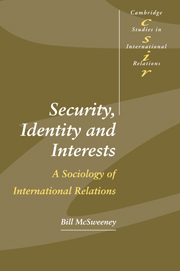Book contents
- Frontmatter
- Contents
- Acknowledgements
- Introduction
- 1 The meaning of security
- Part I Objectivist approaches to international security
- 2 Early stages of development
- 3 Broadening the concept of security
- 4 Identity versus the state
- Part II Theorizing security: the turn to sociology
- Part III Practising security
- Bibliography
- Index
- CAMBRIDGE STUDIES IN INTERNATIONAL RELATIONS
4 - Identity versus the state
Published online by Cambridge University Press: 22 September 2009
- Frontmatter
- Contents
- Acknowledgements
- Introduction
- 1 The meaning of security
- Part I Objectivist approaches to international security
- 2 Early stages of development
- 3 Broadening the concept of security
- 4 Identity versus the state
- Part II Theorizing security: the turn to sociology
- Part III Practising security
- Bibliography
- Index
- CAMBRIDGE STUDIES IN INTERNATIONAL RELATIONS
Summary
The revision of the concept and study of security, which Buzan's work announced in 1983, took a significant turn with the publication of his collaborative project on security in 1993. The introduction of the concepts of ‘society’ and ‘identity’ into the analysis of international security can be seen as a transitional phase in a shift within the mainstream tradition from material to cognitive structural resources and from state to human subjects of security.
At first glance, their new emphasis on society and identity, conjoined in the concept of ‘societal identity’, answers some of the criticism levelled at Buzan. His failure, arising from his assumption of the primacy of the state, to accord significance or autonomy to human beings as the referent of security and to the sub-state groups to which they belong, was now apparently to be rectified. Another factor which will contribute to its appeal and its influence is its focus on societal identity as the core value vulnerable to threats and in need of security. Identity has been a fashionable preoccupation of social scientists for many decades prior to its emergence in the media as a major cause of upheaval in Central and Eastern Europe and a source of resistance to integration in the European Union. Identity is a good thing, with a human face and ephemeral character which make it at once appealing and difficult to grasp.
- Type
- Chapter
- Information
- Security, Identity and InterestsA Sociology of International Relations, pp. 68 - 78Publisher: Cambridge University PressPrint publication year: 1999

